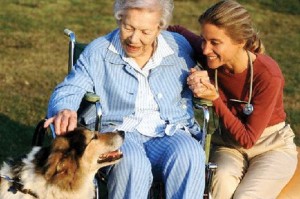By Avow Hospice, Inc. –


Now taking almost any kind of breath is a struggle for Susan, who was diagnosed a decade ago with Chronic Obstructive Pulmonary Disease (COPD). Since her diagnosis, Susan has experienced several bouts of pneumonia and frequent hospitalizations that have frightened and weakened her. She finds it increasingly difficult to shower or get dressed, have dinner with friends or get a good night’s sleep because it is so difficult to breathe, even with oxygen. Susan’s family is stressed, too, as they search for help and take turns trying to give her all the support and care she needs.
“COPD can be frightening and uncomfortable for patients and their families both,” says Dr. Paul Mitchell, Chief Medical Officer of Avow Hospice. “It’s not uncommon for COPD patients to make multiple visits to the local emergency room because they have trouble breathing and begin panicking. Even after being hospitalized, COPD patients often need an extended period to recover because they’re exhausted from being unable to rest. Families also suffer from the repeated crises – it can be very stressful to run a household or maintain a job when you also have to care for someone with a chronic disease like COPD.”
Some families engage the help of home health services to assist the patient, says Dr. Mitchell, but soon find there are limits to what such agencies can offer. “COPD patients frequently require adjustments in their medications and oxygen to increase their comfort, often at night,” says Dr. Mitchell. “Home health agency personnel aren’t licensed to provide that kind of support and families can be overwhelmed by such demands. That’s where supplemental care from a hospice interdisciplinary team can make a big difference in the lives of patients and their families.”
The hospice interdisciplinary team includes physicians, nurses, home health aides, social workers, complementary therapists, bereavement specialists and chaplains to help the patient and family cope with all the dimensions of a serious illness. Avow’s nurse, for example, could adjust and dispense medicines to Susan right at home, avoiding a trip to the doctor’s office or emergency room. An Avow chaplain could work with the family to better understand their feelings and cope with changes in Susan’s condition. Avow’s team works with patients’ primary care physicians, supporting their plans of care and helping patients to avoid crises and disruptions to their families.
Susan and her family have talked about how hospice care from Avow can help Susan feel better so she can get back to the activities that have always given her so much pleasure. Her family is relieved to have an entire support team waiting to help them cope with Susan’s illness and the way it has impacted their lives. Susan’s doctor is also relieved that Susan will experience fewer chaotic and frightening episodes as she lives with her illness.
Many people think hospice care is only for cancer patients or those at the very end of life. In reality, hospice care from Avow can go a long way to improving the quality of life for patients suffering from any complex illness, such as Susan and other COPD patients. How can Avow help you or someone you love? Call us today.
Avow provides hospice and palliative care services to residents of Collier County. Not sure what kind of help you or a loved one needs?
Call us at 239-261-4404 for a personal consultation with one of our care specialists.
 Southwest Florida's Health and Wellness Magazine Health and Wellness Articles
Southwest Florida's Health and Wellness Magazine Health and Wellness Articles
